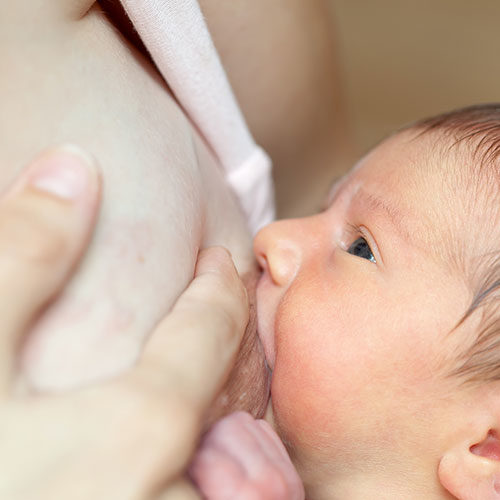What is Cow’s Milk Protein Allergy in Breastfed Babies (CMPA)
Cow’s Milk Protein Allergy or CMPA is also called Cow’s Milk Protein Sensitivity or Cow’s Milk Protein Intolerance depending on its severity. For this article’s purpose, we will call it CMPA.
How is CMP transferred to the baby?
When a breastfeeding woman consumes cow’s milk or other dairy products, certain cow’s milk antibodies pass into her milk in the form of proteins. These are cow’s milk proteins and not lactose. (so, not to confuse it with lactose intolerance) When a baby is sensitive or allergic to these proteins, the baby will show symptoms.
Symptoms:
A baby having CMPA could have symptoms like diarrhoea, blood in stool, constipation, vomiting, rashes, eczema, runny nose, wheezing etc. The baby may also display colic-like symptoms and is fussy and uncomfortable.
Treatment:
The treatment for CMPA is very simple. It is the elimination of dairy products from the mother’s diet. The most obvious dairy products include –
- Milk
- Cheese
- Butter
- Yoghurt
- Cream
- Curd
- Cottage cheese (Paneer)
- Ghee
- Custard
- Ice cream
If the baby has mild to moderate sensitivity, removing the above sources of CMP from the mother’ diet can take care of the symptoms. However, if the baby is severely allergic and intolerant to CMP, then the mother might have to eliminate all sources of CMP. This might require professional help from a dietician or nutritionist. Some Hidden dairy products are listed by Kellymom here.
Things to Remember:
- CMPA does not require the baby to be taken off breast milk and put on a special formula. In fact, in recent times, a 500% increase in a prescription for special formula has been observed on account of CMPA. This has raised questions of industry-driven overdiagnosis.
- It can take up to 21 days for all traces of CMP to leave the mother’s system. So, even after the mother eliminates dairy from her diet, symptoms in the baby may take 2-3 weeks to fade.
- When a mother eats cooked dairy products, it might reduce the allergens but won’t eliminate them. So, better to avoid dairy in all forms.
- Most babies with CMPA are also allergic to goat’s milk, sheep’s milk and soy.
- Switching to lactose-free dairy products won’t serve the purpose because the problem is not lactose, it is the CMP.
- Many babies outgrow CMPA by the age of 6-18 months. And Most babies outgrow it by the age of 3 years. The mother can reintroduce dairy in her diet at intervals of a few months to check if the baby is still reacting to it. Some mothers choose to reintroduce dairy only after the baby has completely weaned off.
Precautions to Take:
When a breastfeeding woman eliminates dairy from her diet, the breast milk will not run short on any nutrients including calcium. But it could make the mother deficient. So, it is important that she introduces other sources of calcium in her diet.
References :
https://www.llli.org/breastfeeding-info/cmpi/
https://kellymom.com/health/baby-health/food-sensitivity/#protein
https://www.breastfeeding.asn.au/bfinfo/breastfeeding-and-food-sensitivities
https://www.breastfeedingnetwork.org.uk/cows-milk-protein-allergy-cmpa-and-breastfeeding/
https://www.bmj.com/content/363/bmj.k5056?fbclid=IwAR2f-bt06gh-Qqy2Vt-ppJwOa143aiEzZ7pX_PYrBuswQXkb7JzETTH6YkE
Wish to speak with a member of our team who is a certified lactation professional and also an experienced breastfeeding mother, click on this link.
Medical Advice Disclaimer
THIS WEBSITE DOES NOT PROVIDE MEDICAL ADVICE.
The information, including but not limited to, text, graphics, images and other material contained on this website are for informational purposes only. No material on this site is intended to be a substitute for professional medical advice, diagnosis or treatment. Always seek the advice of your physician or other qualified health care provider with any questions you may have regarding a medical condition or treatment before undertaking a new health care regimen, and never disregard professional medical advice or delay in seeking it because of something you have read on this website.
Disclaimer
We understand and acknowledge that parents and babies can be of various genders on a spectrum of LGBTQI+. Families come in diverse flavours. However, in our articles, for the sake of simplicity and convenience, we will be referring to the breastfeeding parent as the mother and using the female pronouns- ‘she’ and ‘her’ for babies. Babies can be nourished and nurtured in different ways and while we have used the terms breastfeeding and nursing, we recognize that parents can opt to chest feed or finger feed.
We don’t have conflicts of interest and declare, and we are compliant with the WHO code of marketing of breastmilk substitutes and the IMS act.
In case you find any information on this website that needs to be updated, please write to us at info@bsim.org.in






